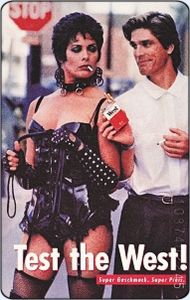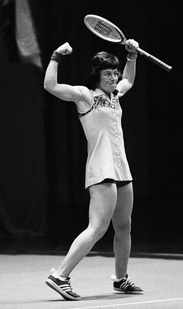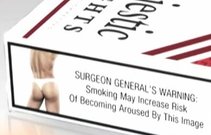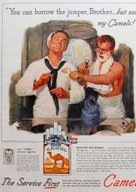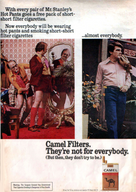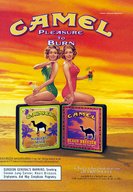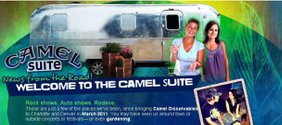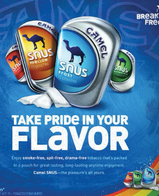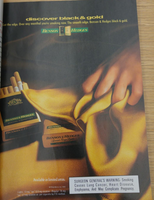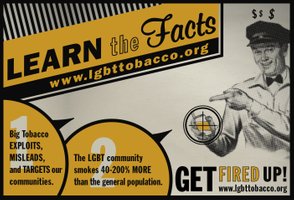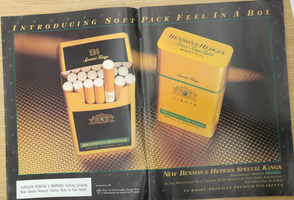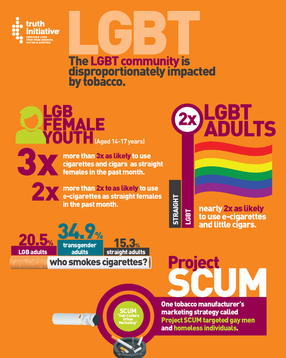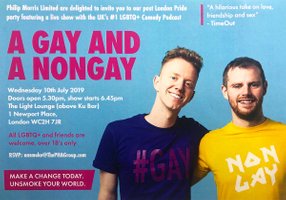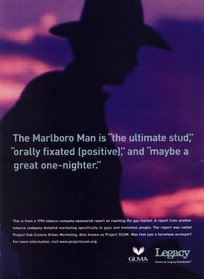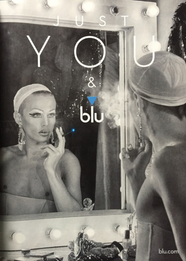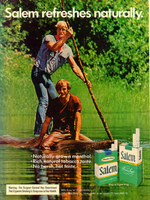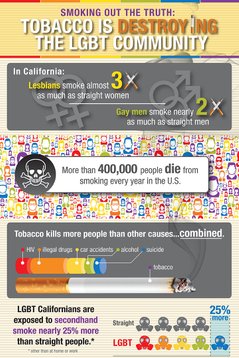Marketing the Rainbow
Click on pictures for larger image.
Introduction
Tobacco is probably one of the most controversial products in fmcg, marketing - and Marketing the Rainbow. "Big Tobacco"* has shown a particular interest in the LGBT demographic - after being beaten back in its controversial efforts to woo blacks and women. Earlier settlements limited ads for tobacco on billboards and magazines with “high youth readership”, while product placement and branded merchandise were 'outlawed'. A gay marketing firm reported: “This is a dream market, with consumers that are attention-starved and very loyal”. The ads twist cherished LGBT values, like freedom, choice and pride, manipulating them to make smoking seem appealing to the community.
A special Thank You to Gabriel Glissmeyer and Laura Henry, whose presentation "Glitter, Smoke, and Mirrors: Tobacco Marketing in LGBTQ Spaces" for the Opportunity Conference in 2017 was very helpful to get a systematic overview of "Marketing the Rainbow & Tobacco".
This article was last updated Mar 6, 2022.
West
West is a German brand of cigarettes, currently owned and manufactured by Imperial Brands via Reemtsma. Their ads - starting in 1991 - have included drag queens (incl. one looking like Divine), leather boys, a camp dominatrix, lesbian bikers, a 1993 gay wedding decades before it became legal, and effeminate smokers. They are a frequent sponsor of gay events.
As tobacco brands go way back, there are print ads from the middle of last century - which may look gay vague, but where not meant that way. Lucky Strike had two such ads: two guys in uniform and two men in tuxedos.
Only from the 90s onwards, the intention was to represent and woo the gay customers. An ad in OUT magazine in 1998 showed three guys in a park in a cruisy situation. Another one from Spain (2000) pictures two women in an intimate pose, with the pay-off "I choose" (= LGBT rethoric).
France
In several countries, like France, 'anti-ads' were made to alert consumers to the dangers of smoking. The French campaign contained two images that could be considered gay.
PM announced in 1999 that lesbian activist and tennis star Billie Jean King (who came out in 1981) had been elected to its board of directors. King's relationship with Philip Morris began in 1970 when the company formed the Virginia Slims Tennis Tour. "We look forward to the unique perspective that she will bring to Philip Morris," said CEO Geoffrey Bible. King's appointment was controversial - she refused to talk about the compensation of $80,000 in salary and stock options - but she was unapologetic of her loyalty to PM. Without Philip Morris, King argued, women's tennis would not be where it is today. She no longer serves in that capacity now.
The decision by Ms. King, a role model to many girls and women, stood in stark contrast to the US Women's Soccer Team. They had taken an active role in persuading young women, and young men, from taking up smoking. They appeared in tobacco control advertisements, and spoke to youngsters about the importance of staying smoke-free. The soccer players passed on the message: if you want to play sports, and you want to succeed, don't smoke. It was unfortunate that Billie Jean King was not passing on a similar message to young tennis players.
The counter movement
CDC parody - It’s gay to smoke (2009)
This was not a genuine public service announcement from the Centers for Disease Control and Prevention (CDC), but it was a satirical publication from The Onion. The video from 2009 warns against the dangers of smoking: “We’re saying, if you choose to smoke, people are going to make fun of you for looking like a queer,” says “Dr. Michael Gaines,” an official from the CDC.
In 2021 the video made a reappearance on TikTok after someone said “Show me an advertisement that wouldn’t be acceptable today". The Onion’s video was viewed nearly 2.9 million times in 12 years time. Meanwhile, in less than a week, the TikTok video had over than 3.4 million views.
Virginia Slims
Virginia Slims sponsored the Women's Tennis Association Tour from 1971 to 1978 and 1983 to 1994. This sponsorship is sometimes credited for the growth and success of women's tennis during the 1970s and early 1980s. Virginia Slims also sponsored the Virginia Slims Circuit, a tennis tour consisting of a group of originally nine female professional players, which included Billie Jean King. By 1993 Virginia Slims had a strong presence in the lesbian press, also advertising with Martina Navratilova.
© 2022 BRIGHT Marketing Solutions
* “Big Tobacco" usually refers to the 6 largest tobacco companies: China National Tobacco Company, British American Tobacco, Altria/Philip Morris (PM), R.J. Reynolds (RJR), Imperial Brands and Japan Tobacco International.
R.J. Reynolds
Camel
RJR's most famous brand might well be Camel, created in 1913 as one of the first packaged cigarettes. They have targeted the gay customers regularly. A classic ad, probably from the 1940's that shows two sailors and says "You can borrow the jumber, Brother... but not the Camels" could be interpreted as gay vague now, but was not intended as such at the time . The same probably goes for the camp print ad from 1972, which shows a guy in hot pants, just for the sake of free "short short cigarettes".
Camel Snus was the only commercial tobacco product advertised in Lavender - and this ad (on the right) was only placed in this magazine, nowhere else.
Benson & Hedges
As early as 1992, B&H advertised in Genre magazine. Yet, gay men seem to buy more Marlboro: research shows that "The Marlboro Man" might be part of the gay appeal. Remarkably, Marlboro never targeted LGBT with special images: apparently the "Man" was enough.
Lucky Strike
The American Tobacco Control Network
ran some campaigns aimed at LGBT, having established the higher risk they run. One of their partners is LGBT HealthLink, a community-driven national network of experts and professionals enhancing LGBT health.
The California Department of Health Services, in collaboration with the California LGBT Tobacco Partnership strived for a smoke-free outdoor spaces during San Francisco Pride (2006). Some campaigns had pun-inteded slogans, like "Last Drag" or "Learn how to quit smoking without being scared straight".
American Spirit
As mentioned above in many cases the campaigns featured messages of freedom and choice that mirror language used by LGBT+ activists. In 2005, RJR's American Spirit launched an ad listing various “freedoms,” including “freedom to choose” and “freedom to marry” along with “freedom to inhale.”
Imperial Brands
was formerly as Imperial Tobacco Group plc, and is a British multinational tobacco company.
West also brought us an outrageously uncommon depiction of Santa as a drag queen (who is first near-naked), visited by a leather man - complete with dog collar and chest harness - and his biker companions in reindeer antlers and sunglasses. The openly gay director, Magnus Tear, noted many gay people worked on the effort and said, "I feel we somewhat freed poor Santa from his normally quite sugarsweet and hetero-linear presentation. Who said that Santa wasn't gay? Or bi? Or black or pansexual?" Indeed.
This Free Life - a number of firsts
In 2016 the Food and Drug Administration decided to step in and launch “This Free Life,” the first-ever, federal anti-smoking campaign aimed at young LGBT folks. The tagline "Freedom to be tobacco-free".
It was the first multi-market, primarily digital campaign designed to change tobacco-related beliefs among LGBT young adults. The 3-year campaign (2016-2019) only had a
Due to the higher risks of addiction, and hence health problems, in the LGBT community, many initatives arose to counter the rainbow marketing of Tobacco and E-cigs. (Semi-)governmental organizations like FDA, CDC and Public Health Law Center (webinar) as well as community initiatives like The National LGBT Cancer Network ("Out, Proud, Free"), Counter Tobacco’s LGBTQ Tobacco Use podcast and The Truth Initiative ran campaigns to oppose those from the brands.
The counter movement was not limited to the USA.
Why target LGBT?
In addition to their loyalty and known high(er) discretionary incomes, studies consistently found substantially higher smoking rates among LGBT than among heterosexuals. Health professionals are not surprised: the pressures that result in teenage smoking - self-esteem issues and the need for peer acceptance, the need for rebellion and liberation, the development of style and individuality - are even stronger for LGBT struggling with their sexuality.
SCUM
The strategy to target the LGBT community was uncovered via the tobacco industry’s internal “Project SCUM” (Sub-Culture Urban Marketing) document (R.J. Reynolds Tobacco Company. Project Scum. 12 Dec 1995).
The industry has since spent millions to approach the LGBT community: examples include making campaign contributions to LGBT elected officials, funding AIDS and LGBT organizations and sponsoring Pride marches, LGBT street fairs and film festivals. Today’s e-cigarette companies have followed suit by supporting LGBT-friendly events, including the e-cigarette company VaporFi’s sponsorship of an annual Pride festival in Miami.
Social media
In the 2010's when the popularity of social media rose, many brands opened accounts on platforms such as Facebook, Snapchat, YouTube and Instagram to promote their products and events.
small effect on beliefs involving social aspects of smoking. Slogans were "This life is non-toxic" and "Show off your shine".
Here's one of the campaign's cheekiest ads, "Be Known for Your Flawless," which also happens to be the first federal ad to feature drag queens, namely Shangela, Manila Luzon, Trixie Mattel and Tammie Brown.
The campaign won numerous awards.
The ever increasing negative publicity around smoking resulted in the product innovation of e-cigarettes. Iqos was introduced in 2014 under the Marlboro and Parliament brands. Although it was marketed as a novel product, it is very similar to "Accord" which they released in 1998; however, the IQOS sticks have more nicotine, more tar, and less tobacco. After Iqos was launched, PM bought newspaper adverts and paid for events. It even funded a new website by Vice, Change Incorporated, that would publish articles on ending smoking, and sponsored Gay Star News’s health section with their "Unsmoke Your World" campaign, and hosted a Pride afterparty which it advertised at IQOS shops in London.
Iqos
Parliament
This brand advertised with a series of sunny, Greek styled life-style ads from 1994-1998, i.a. in OUT magazine. The persons depicted in the ad were mostly two men and one woman or two women and one man. However, the same ads in for instance Rolling Stone or Cosmopolitan only showed a man + woman.
Philip Morris
Perhaps the most active company in this field has been Philip Morris, now known as Altria Group, Inc. Their brands include Marlboro, Virginia Slims, Benson & Hedges, Merit, Parliament, Chesterfield, L&M, and others. As of 2018, Philip Morris also owns a minority stake in JUUL (electronic cigarettes).
Billie Jean King
How it began
The LGBT population became a focus of the tobacco industry since Philip Morris placed its first tobacco ad in Genre magazine in 1992. A 1985 Philip Morris (PM) memo had stated: “It seems to me that homosexuals have made enormous progress in changing their image in this country... A few years back they were considered damaging, bad and immoral, but today they have become acceptable members of society... We should research this material and perhaps learn from it.”
Editors of gay publications needed and wanted more advertisers. “Barriers are beginning to fall. It says ‘we respect you as consumers and we want your business'. I would gladly accept tobacco advertisements.” said Jerry Williams, publisher of Gay Chicago in 1992. Don Tuthill, Genre magazine said: “I’m just celebrating being part of the mix. We’re not being excluded any longer”, while Jeff Yarbough of The Advocate stated: “we are in a beggar’s position, rather than a chooser’s position.”
Then there were a few sponsorships of bars and local events in the 80s
In a 'dynamic' clip from 1999 we see a number of short scenes inside an apartment building. One of these is of a guy holding an inflatable male sex doll.
Camel hosted a booth at the 2000 San Francisco Pride parade, and sponsored an after party at a popular gay nightclub.
Even GLAAD, often considered the conscience of "Marketing the Rainbow" succumbed to the lure of tobacco money. Lucky Strike advertised quite ostensibly in the 2001 GLAAD awards program leaflet, including a somewhat confusing message of support "Whenever someone yells 'Dude, that's so gay', we'll be there". Do they mean someone smokes Luckies and then yells that? Or that getting Lucky Strike solves the problem?
In Germany, they also advertised in the gay press (2008).
Nobel
The Spanish brand Nobel had two kissing gay couples and a puzzled woman in a print ad in 2000.
Montclair was one of America’s classic cigarette brands, ownership changed a few times (it is now owned by ITG Brands). After having disappeared for a while, they were reintroduced in 2013. A campaign from what looks like the 70's uses images of rather effeminate men - but this was before the time that Tobacco started to target LGBT, so my guess it that it was meant as fun?
Blu
In 2015, e-cigarette brand Blu launched their "Just You, and Blu" campaign with a drag queen sitting in the dressing room.
Salem
A 1974 Salem ad showed two men on a log, happily making their way across a river. This must have been 'just friends' - even though it is brimming with gay symbolism - as this was before the industry realized the potential of gay smokers, and two decades before the first ad in the gay press.
Montclair
The LGBT population has one of the highest smoking rates compared to any other group: gay men’s smoking rate is 50% higher than heterosexual men. Lesbians smoke almost 3x more than straight women. Bisexual men and women have the highest rates among LGBT communities, with almost one-third of the population smoking. Vaping became an LGBT-related problem too: black transgender youth are 6 times more likely to vape than black cis youth, while Asian transgender youth are 3.5 times more likely to vape than asian cis youth. LGB people are 5 times more likely than others to never call a smoking quitline...
It's not surprising, therefore, that tobacco companies would consider lesbians and gays to be a perfect niche market. It's even less surprising that Philip Morris would lead the way; the company began noticing the lesbian and gay community in 1990 after a boycott by the ACT UP (AIDS Coalition to Unleash Power) over Philip Morris' support of Senator Jesse Helms, resulting in increased tobacco industry contributions to AIDS organizations. In 1994, Philip Morris was the number one contributor to the Gay Men’s Health Crisis ($150,000. RJR gave $50,000) and had contributed more than $14 million to HIV/AIDS efforts in the US since 1986.
In the US, LGBTspend $7.9 Billion on tobacco products every year, which is 56x the amount spent on donations to LGBT lobby organizations.
In 2020, Expose Tobacco reported: "For the Tobacco Industry, Pride Month is a PR Opportunity. This Pride Month, tobacco companies used social media to tweet messages of support for their LGBTQ employees and colleagues." But this was just to support their marketing efforts, no so much support of the community.
Njoy
NJOY is an independent American company that manufactures and distributes electronic cigarettes and vaping products. They advertised in OUT magazine in 2013 with variations of their ad campaign, that were more sexual, 'stylized' for the gay consumer: "Size matters" and "Try something new in bed".
Case study: Tobacco
Branche: fmcg

